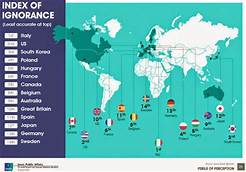With the 2020 election a little more than two weeks away, I found myself speculating on how informed the American electorate is. Given a biased mainstream media, I wondered if American voters are able to make an informed decision when they mark their ballots.
A few years ago during an academic conference, MIT professor Jonathan Gruber referred to the “stupidity of the American voter” and his comments ignited a firestorm of outrage.
But was Gruber wrong when he made those off-the-cuff remarks about the American electorate?
Sadly, it appears that he may have been right in his assessment. According to at least two recent surveys, Americans are woefully ignorant when it comes to their country and its governance.
Ask them to name just one Supreme Court Justice and 65 percent can’t, according to the Annenberg Public Policy Center.
It gets better. Ask Americans to name the three branches of their government and 36 percent of Americans can’t. Ask them to name just a single branch of government and 35 percent can’t even do that.
But in a nation consumed like no other with celebrity, ask Americans to reel off the names of the top rock stars, gansta rappers, Oscar favorites, superstars in the NFL, NBA and Major League Baseball, and any number of mindless reality TV shows and their minions and guess what? You will have no problem getting an answer.
So while Gruber was pilloried for his remarks, the sad truth is that he was right. American voters are stupid–or perhaps apathetic or indifferent are better descriptions.
Lying to them, as the Obama administration did when it was ramming Obamacare through Congress and down our throats, was viewed as an acceptable tactic. After all, they reasoned, Americans are too stupid to know what’s good for them.
Remember President Obama’s famous fib: “if Americans like their doctor, they’ll be keeping their doctor. You like your plan? You’ll be keeping your plan.”
While such a conclusion about the stupidity of the American voter may smack of somebody’s opinion, it was backed up last month in a groundbreaking survey by the U.K. research firm Ipsos MORI. That survey highlighted the political “ignorance” of 11,527 people across 14 countries
It found that Americans are second only to Italians in how little we understand our nations and the issues facing it. (See Graphic)
Here are a few of the questions asked and the results:
- What percentage of the U.S. population identifies as Muslim?
Americans guessed: 15%. Reality: 1% - What percentage of the population do you think are immigrants to America?
Americans guessed: 32%. Reality: 13% - Do you think this statement is true or false: The murder rate is rising in America
70 percent of Americans guessed: True . Reality: False - What percentage of American girls aged between 15 and 19 years give birth each year? Americans guessed: 23.9%. Reality: 3.1%
Back in 2008, Rick Shenkman, the editor-in-chief of the History News Network, published a book entitled: Just How Stupid Are We? Facing the Truth about the American Voter.
Shenkman found that most Americans were, among other things:
- Ignorant about major international events
- Knew little about how their own government runs and who runs it
- Were nonetheless willing to accept government positions and policies even though a moderate amount of critical thought suggested they were bad for the country
- Were easily swayed by stereotyping, simplistic solutions, irrational fears and public relations babble.
Shenkman found that Americans, when they do pay attention, do so when they perceive that an issue may impact them, their families or friends personally. That is not earth shattering, but it does say something about the fact that Americans, like it or not, are part of the global family.
I spent some two decades as a foreign correspondent, covering stories throughout Asia and Latin America. During that time I discovered that relatively few Americans had any understanding at all of the impact events and policies in places like China or Japan can have on their lives.
For example, when products are manufactured more inexpensively in China or India or Vietnam that often means higher paid Americans lose their jobs.
When rapacious government policies allow a Chinese steel company to export its products at a price that is lower in the American market than the price charged in the domestic Chinese market, and thereby unfairly undercut American steel makers, that is called “dumping.”
What most Americans may not know is that dumping is legal under World Trade Organization rules unless the aggrieved foreign country can demonstrate the negative impact of the exporting company on domestic producers. In order to counter dumping, most nations use tariffs and quotas to protect their domestic industry from the negative effects of predatory pricing.
But let’s get back to that Ipsos MORI survey and Gruber’s unflattering characterization of the American voter.
We often decry the quality of elected officials today. But what about the quality of voters?
How can we make informed decisions about places like Iraq and Iran, organizations like ISIS, government spending, and societal issues if we have no understanding of the essential specifics involved?
American educator and philosopher Robert Maynard Hutchins may have said it best:
“The death of democracy is not likely to be an assassination from ambush. It will be a slow extinction from apathy, indifference, and undernourishment.”


